News
BioMed Alliance replies to new consultation on HTA & cooperation with the EMA
- Details

In a new public consultation response, BioMed Alliance shares its views on the proposed implementing regulation detailing procedural rules for the cooperation of the Member State Coordination Group on Health Technology Assessment (HTA) and the Commission with the European Medicines Agency. While welcoming the draft regulation, the Alliance also shares key recommendations on the timely and efficient exchange of information, creating synergies, involving experts, and balanced conflict of interest policies. The feedback is published on the EU Have Your Say Portal here, and replies to the consultation will be considered before the final regulation is adopted.
Read the consultation reply here.
Update June 2024
- Details
Our June update is out now and provides you with insights on EU policy developments and BioMed Alliance activities. In this edition you will find more information about our recent reply to a HTA consultation on conflict of interest, a EU4Health Stakeholders' Conference, prioritising health post EU-Elections, the report on the Joint HMA/EMA multistakeholder workshop on Patient Registries, the EMJ Roundtable discussion with BioMed Alliance, the new Guidance document on the Clinical Evaluation of Orphan Medical Devices, the IHI Call 8, the study on Deployment of AI in healthcare, and information on upcoming events.
Medical societies share their views on managing competing interests in HTA
- Details

The BioMed Alliance has replied to a public consultation on HTA on procedural rules for assessing and managing conflicts of interest. In the reply prepared by the HTA Working Group, the Alliance welcomed increased cooperation on joint Health Technology Assessment (HTA) as we believe this can enhance the affordable and equitable access to innovative new health technologies for European patients. Such assessments must be evidence-based, and depend on the feedback of patients, clinicians and other experts in the health field.
Transparency throughout this process is key. Declarations of interest must be shared, and risks of potential competing interests managed to reduce the risk of bias. However, conflict of interest policies must also be proportionate and take into account that many (leading) scientists and clinicians with the necessary expertise to provide an authoritative review of a new medicine or medical device, are likely to be involved in a variety of research, academic and regulatory roles. Too restrictive approaches may therefore prevent the inclusion of the necessary expertise, particularly in niche fields like rare diseases.
Read the reply here.
Update May 2024
- Details
Our May update is out now and provides you with insights on EU policy developments and BioMed Alliance activities. In this edition you will find more information about the new statement on proposed PFAS restrictions, updates on the MDR, the Spring Meeting and the newly adopted SoHO regulation
Enhancing BioMed Alliance Activities with the EXHALE operating grant
- Details

The BioMed Alliance has been awarded the EXHALE operating grant (BioMed Alliance EXpertise in Health Across Legislation at EU level) for 2024 under the EU4Health programme (grant agreement no 101176496). This grant aims to further strengthen the representation of medical societies, healthcare professionals, and researchers in the EU health field.
The EXHALE grant will enable the Alliance to enhance the expertise and knowledge of the medical and research communities on the regulatory system and policy developments in the health field, and how these impact their work. The focus will be on EU4Health priorities including the Medical Devices Regulation, In Vitro Diagnostics Regulation, the European Health Data Space, Health Technology Files, and the Health Emergency Preparedness and Response authority.
Over the coming months the BioMed Alliance will work with its Committees and Task Forces to build on the proposed activities, strengthen its representation at EU level and build skills in the regulatory field. We will organise a series of workshops and share materials, and more information will follow soon.
New statement advocates for a balanced approach to phasing out PFAS
- Details

In a new statement, BioMed Alliance provides insight on the harmful impacts of Per- and polyfluoroalkyl substances (PFAS) and urges manufacturers of medical devices to find safe alternatives whilst ensuring that essential devices don’t disappear from the market. The statement advocates for a balanced approach for the phasing out of PFAS by advocating for research on finding alternatives as well as facilitating the use of exemptions for a limited time period in order to avoid the loss of medical devices from the market.
Read the full statement here.
Update April 2024
- Details
Our April Update is out now and provides you with insights on EU policy developments and BioMed Alliance activities. In this edition you will find more information about the new statement on the implementation of the EHDS, the consultation survey on the EU4Health programme, the new statement on the MDR, theEU4Health operating grant received by BioMed Alliance, the ESCMID Global congress, and member news.
New statement raises awareness on urgent deadline to avoid medical devices from disappearing
- Details
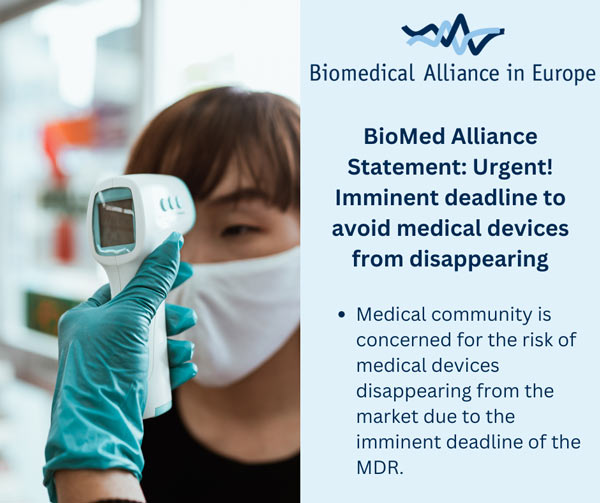
In a new statement, BioMed Alliance highlights its concerns regarding an imminent deadline in the Medical Devices Regulation (MDR), which will manufacturers have to meet to keep their devices on the market. It is foreseeable that devices may be withdrawn from the European market in the coming period, which could lead to shortages of medical devices.
As of 26 May 2024, manufacturers will be required to meet a critical deadline for legacy devices, in order to benefit from the extended transition periods. By this date, they will need to have applied for conformity assessment under the new regulation with a notified body, and have a MDR Quality Management System (QMS) in place. Due to several reasons including the high costs of certification, manufacturers may decide not to apply for MDR and their devices will thus not benefit from the extended transition period after the 26th of May. Particularly devices for small patient groups, such as paediatric and orphan devices may be affected. In response, the statement provides both short and long-term recommendations aimed at preventing the potential loss of medical devices.
Read the full statement here.
Implementing EHDS: medical societies advise on how to bring health data sharing to the next level
- Details
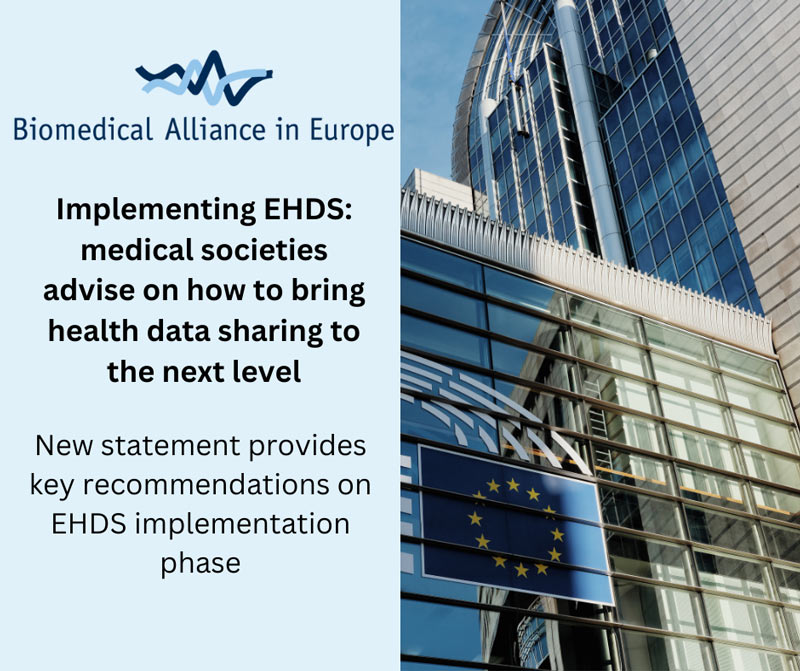
In a new BioMed Alliance statement, medical societies provide key recommendations on the European Health Data Space (EHDS) implementation. The statement follows the European Parliaments adoption of the political agreement with the Council on 24 April and highlights what is necessary to make EHDS provide a concrete added benefit to patients, doctors and researchers across Europe.
In the statement, the 34 members of the Alliance welcome the agreement, while providing input on remaining key issues that need to be addressed in the implementation and operation phases. These include the need for further stakeholder engagement, the importance of ensuring a harmonized opt-out mechanism, further clarification for definitions and legality, and increased support for healthcare professionals and researchers. We invite you to read the full statement here.
Charting the path forward: New joint stakeholder statement on the implementation of the EHDS
- Details
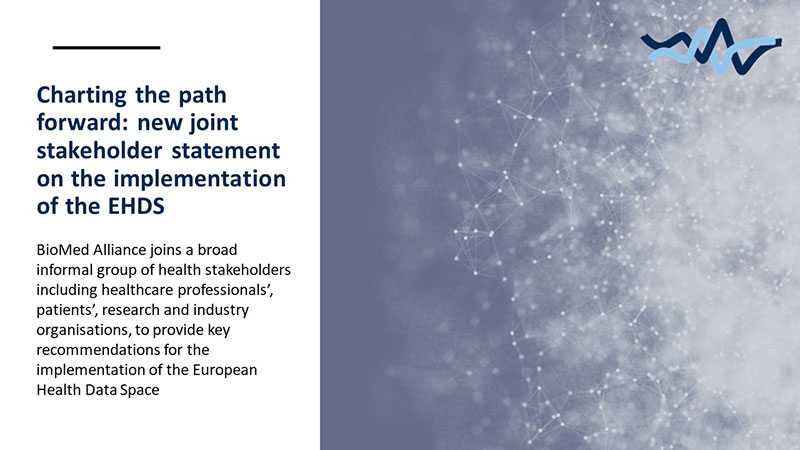
BioMed Alliance contributed to a new statement on the implementation of the European Health Data Space signed by 36 organisations representing healthcare professionals, patients, industry and other health-related stakeholders. In the statement, the EU health community welcomes the agreement on the European Health Data Space (EHDS) proposal, but also provides key recommendations to ensure the EHDS will be implemented in a way that provides most added value for patients and European health systems. Read the statement here.
Update March 2024
- Details
Our March Update is out now and provides you with insights on EU policy developments and BioMed Alliance activities. In this edition you will find more information about the passing of our former BoD member Tobias Welte, progress with the AI Act, EHDS and revision of the pharmaceutical legislation, the final conference of CORE-MD, the agenda of our Spring Meeting, a HERA survey on training needs, the launch of the Critical Medicines Alliance and member news.
BioMed Alliance replies to consultation on HTA Implementing Regulation
- Details
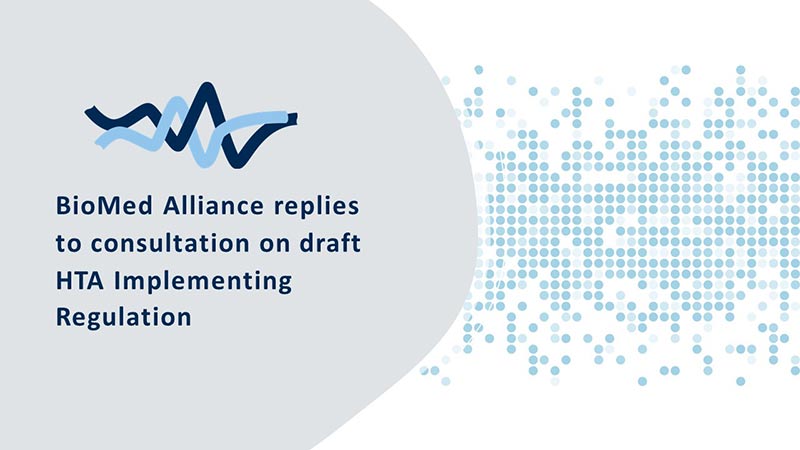
BioMed Alliance replied to the public consultation on the HTA Implementing Regulation on joint clinical assessments of medicinal products. In the reply, BioMed Alliance argues that the involvement of stakeholders including clinicians is key to achieve a high scientific quality of joint clinical assessment reports. In order to facilitate the process and ensure the right experts are able to provide a meaningful contribution, it is necessary to ensure a systematic and consistent involvement of stakeholders, facilitate cooperation with medical societies as key partners, give sufficient time for stakeholders to provide their input, and set up appropriate conflict of interest policies. The reply is available here and on the ‘have your say’ website.
BioMed Alliance mourns the passing of Tobias Welte
- Details

BioMed Alliance is deeply saddened by the passing of Prof. Tobias Welte on 10 March, at the age of 64. Tobias Welte was a valued member of our Board of Directors and was Treasurer until 2023. He was a high-level expert in the field of respiratory medicine, and made numerous contributions during the COVID-Pandemic and to his field in general. Our thoughts are with his family and friends during this difficult period.
Update February 2024
- Details
Our February Update is out now and provides you with insights on EU policy developments and BioMed Alliance activities. This edition shares information about our new statement on the EHDS, our engagement with the MDCG, the save the date for our Spring Meeting, an interview with our President, the CORE-MD final conference, cuts in the funding for EU4Health & Horizon Europe, new EMA catalogues on real world data and members news.
New multistakeholder statement on EHDS
- Details
The BioMed Alliance has contributed to a joint statement issued by a large multistakeholder group, representing the entire spectrum of the healthcare ecosystem and consisting of 35 European patient organisations, medical associations, health research infrastructures and health industry associations on the EHDS. The statement raises our ongoing common concerns about legislative shortcomings and uncertainties in the proposed Regulation for a European Health Data Space (EHDS) currently being negotiated in trilogues. For more information, please read the statement here.
Healthcare professionals and researchers share recommendations for trilogue discussions on EHDS
- Details
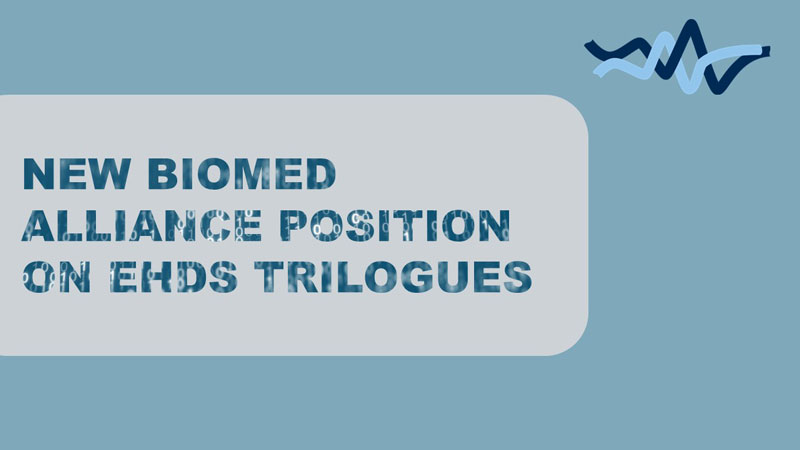
The BioMed Alliance has published a new statement in light of the trilogue discussions on the proposal for a European Health Data Space. Medical societies, and the healthcare professionals and researchers that they represent, welcome the intention of the proposal to facilitate health data sharing for healthcare and research, if the necessary elements are in place. However, some of the provisions that are currently being discussed could lead to fragmentation, legal uncertainty and data bias in the datasets that will be available for research within EHDS.
Read our recommendations here.
Concerns about cuts in EU4Health and Horizon Europe budgets
- Details
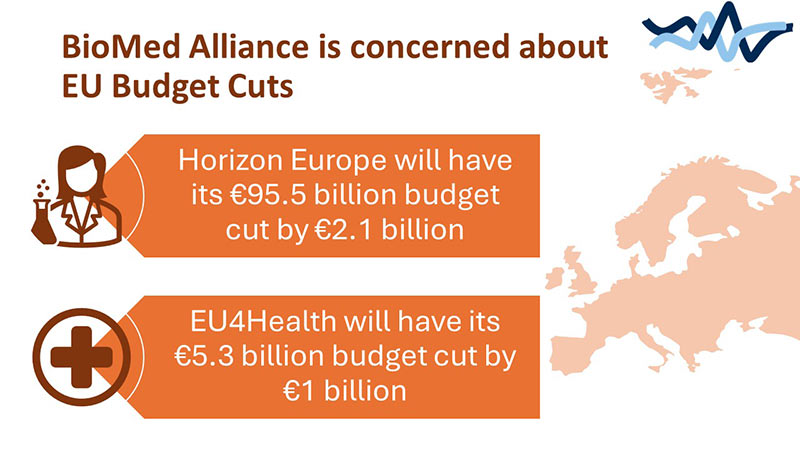
In early February, BioMed Alliance expressed its strong disappointment with political decisions to cut the EU4Health budget by 1 billion and the Horizon Europe budget by 2.1 billion Euros. With the COVID-19 pandemic still fresh in our minds, and the number of people suffering from chronic diseases steadily increasing, we need more investment in health and research. With the EU elections coming up in June this year we hope that health and research will continue to be a priority in the elections, and for the new Parliament and Commission.
New Vacancy: EU Public Affairs & Communication officer (1 year)
- Details
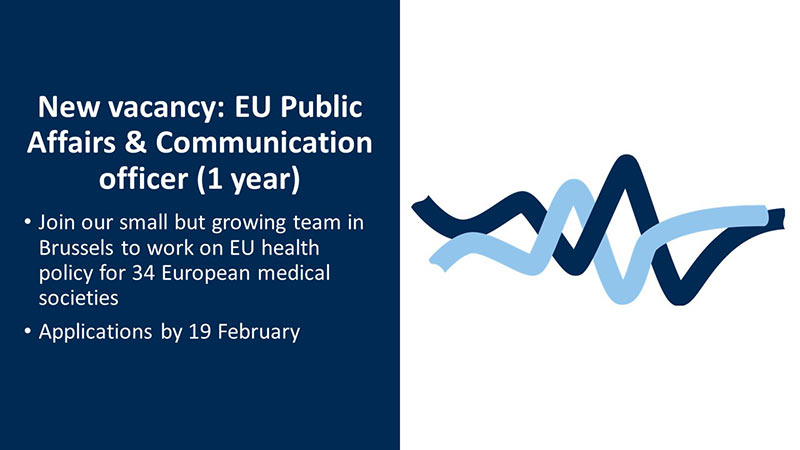
Start: March 2024
The Biomedical Alliance in Europe is a not-for-profit organisation representing 34 leading European associations devoted to medical care and biomedical research. It represents more than 400,000 researchers and health professionals (www.biomedeurope.org).
The BioMed Alliance’s principal goals and objectives are to promote the aims and values of researchers, healthcare professionals and not-for-profit European medical associations and organisations across all medical disciplines.
We facilitate cooperation between our members and represent them in policy and advocacy issues related to health research, continuing medical education and regulatory affairs, including Medical Devices, Academic Clinical Trials, In Vitro Diagnostics and health data sharing. Succinctly, we act as a single voice on transversal health and health research issues, to facilitate multi-stakeholder communication at European level.
Location:
Rue de la Loi 34/36, Brussels
Description:
You will be part of a small team that is responsible for supporting collaboration and communication among the member organisations. You will be involved in the organization of events, communication, the development of advocacy actions, engagement and capacity building with EU decision makers and EU health stakeholders and in providing information to member organizations.
Responsibilities:
- monitor the EU policy agenda (research and health related)
- support the team in developing policy campaigns and help implement a broad range of advocacy activities
- draft reports, minutes and policy briefings
- actively develop and maintain a network of contacts and use contact management tools such as contact databases
- support the team in drafting newsletters and communication activities related to the organization’s activities
- organise meetings and events
- communicate with a broad network of professionals, experts and policy makers
Candidate Profile
- You are highly proficient in spoken and written English, as our work is exclusively carried out in that language.
- You have good writing and analytical skills.
- You have a genuine enthusiasm for public affairs & advocacy and an appetite to discover the not-for-profit universe.
- You have an interest in health and research policy or would like to learn more about these policy areas.
- You should have an outstanding academic record to be able to deal with the multidisciplinary aspects of the role.
- You are an EU citizen or holder of a Belgian work permit
What we offer:
We provide a friendly working environment and the opportunity to acquire excellent professional experience with the purpose to help in starting your career. You will also be able to enhance your knowledge of EU affairs, health and research policy and the activities of medical & research societies.
Description of the proposed contract:
You will start with 6 months of internship followed by a full employment contract of 6 months. The contract is remunerated and could be prolonged after the 1-year commitment. The position is under the “Formation Professionelle en Entreprise (FPI)’s rules proposed by Bruxelles Formation. To be eligible for this type of contract, you must be enrolled in the Actiris platform.
Interested?
Please send your CV, and a short news item written by you on a topic that you consider of interest for the Biomed Alliance, to our Executive Director Loredana Simulescu:
Update January 2024
- Details
Read our new January Update, to get an update on BioMed Alliance activities and new developments in the EU policy sphere. In this edition you will find more information about our newest member, a statement and Commission proposal on extended transition periods for IVDs, our participation in an event on genomic data in EHDS, a consultation on the Cross-Border Threats to Health Regulation, IHI Call 6 & 7 that are open now, our presentation at the HERA board on our recent discussion paper, members news and upcoming events.
BioMed Alliance welcomes a new member: ESCCA
- Details
The BioMed Alliance is proud to welcome a new member, the European Society for Clinical Cell Analysis (ESCCA). We look forward to working with this newest member to continue to raise awareness on the perspectives of medical and research societies across Europe.
ESCCA is a scientific society founded to ensure the continuation of the activities of the European Working Group on Clinical Cell Analysis (EWGCCA). EWGCCA was formed in 1996 with a Biomed-2 grant in order to establish collaboration between sixteen European centres that use and develop flow cytometric applications mainly for clinical purposes. Since 1996 EWGCCA has organised very successful annual European Courses and Euroconferences aimed at the standardisation, validation and dissemination of flow cytometric know-how and its implementation in clinical laboratories. The Courses and Conferences have included presentations by high-profile speakers from the USA. The annual ESCCA European Courses now rank among the world’s largest educational events in flow cytometry.





